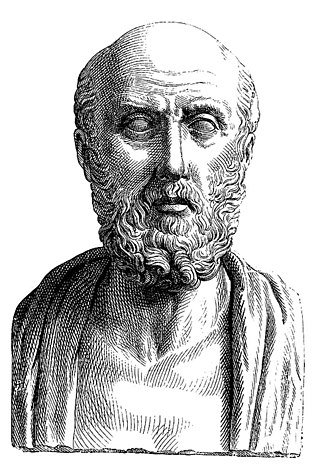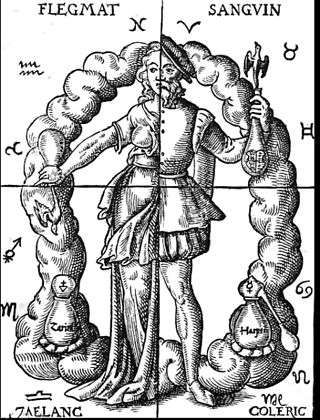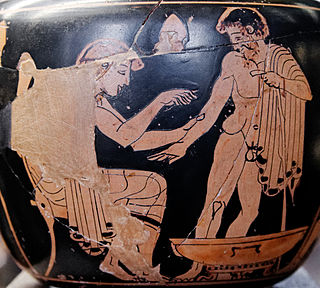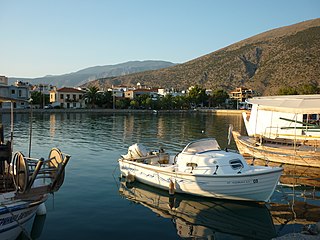
Hippocrates of Kos, also known as Hippocrates II, was a Greek physician and philosopher of the classical period who is considered one of the most outstanding figures in the history of medicine. He is traditionally referred to as the "Father of Medicine" in recognition of his lasting contributions to the field, such as the use of prognosis and clinical observation, the systematic categorization of diseases, and the formulation of humoral theory. The Hippocratic school of medicine revolutionized ancient Greek medicine, establishing it as a discipline distinct from other fields with which it had traditionally been associated, thus establishing medicine as a profession.

The Hippocratic Oath is an oath of ethics historically taken by physicians. It is one of the most widely known of Greek medical texts. In its original form, it requires a new physician to swear, by a number of healing gods, to uphold specific ethical standards. The oath is the earliest expression of medical ethics in the Western world, establishing several principles of medical ethics which remain of paramount significance today. These include the principles of medical confidentiality and non-maleficence. As the foundational articulation of certain principles that continue to guide and inform medical practice, the ancient text is of more than historic and symbolic value. It is enshrined in the legal statutes of various jurisdictions, such that violations of the oath may carry criminal or other liability beyond the oath's symbolic nature.

Kos or Cos is a Greek island, which is part of the Dodecanese island chain in the southeastern Aegean Sea. Kos is the third largest island of the Dodecanese, after Rhodes and Karpathos; it has a population of 37,089, making it the second most populous of the Dodecanese after Rhodes. The island measures 42.1 by 11.5 kilometres. Administratively, Kos constitutes a municipality within the Kos regional unit, which is part of the South Aegean region. The principal town of the island and seat of the municipality is the town of Kos.
Primum non nocere is a Latin phrase that means "first, do no harm". The phrase is sometimes recorded as primum nil nocere.

Humorism, the humoral theory, or humoralism, was a system of medicine detailing a supposed makeup and workings of the human body, adopted by Ancient Greek and Roman physicians and philosophers.

The Hippocratic Corpus, or Hippocratic Collection, is a collection of around 60 early Ancient Greek medical works strongly associated with the physician Hippocrates and his teachings. The Hippocratic Corpus covers many diverse aspects of medicine, from Hippocrates' medical theories to what he devised to be ethical means of medical practice, to addressing various illnesses. Even though it is considered a singular corpus that represents Hippocratic medicine, they vary in content, age, style, methods, and views practiced; therefore, authorship is largely unknown. Hippocrates began Western society's development of medicine, through a delicate blending of the art of healing and scientific observations. What Hippocrates was sharing from within his collection of works was not only how to identify symptoms of disease and proper diagnostic practices, but more essentially, he was alluding to his personable form of art, "The art of true living and the art of fine medicine combined." The Hippocratic Corpus became the foundation upon which Western medical practice was built.

The treatise On Ancient Medicine is perhaps the most intriguing and compelling work of the Hippocratic Corpus. The Corpus itself is a collection of about sixty writings covering all areas of medical thought and practice. Traditionally associated with Hippocrates, the father of Western medicine, philological evidence now suggests that it was written over a period of several centuries and stylistically seems to indicate that it was the product of many authors dating from about 450–400 B.C.

Hippocrates of Chios was an ancient Greek mathematician, geometer, and astronomer.

Ancient Greek medicine was a compilation of theories and practices that were constantly expanding through new ideologies and trials. The Greek term for medicine was iatrikē. Many components were considered in ancient Greek medicine, intertwining the spiritual with the physical. Specifically, the ancient Greeks believed health was affected by the humors, geographic location, social class, diet, trauma, beliefs, and mindset. Early on the ancient Greeks believed that illnesses were "divine punishments" and that healing was a "gift from the Gods". As trials continued wherein theories were tested against symptoms and results, the pure spiritual beliefs regarding "punishments" and "gifts" were replaced with a foundation based in the physical, i.e., cause and effect.
Asclepiad was a title borne by many Ancient Greek medical doctors, notably Hippocrates of Kos. It is not clear whether the Asclepiads were originally a biological family, or simply a member of an order or guild of doctors.

The Tree of Hippocrates is the plane tree under which, according to legend, Hippocrates of Kos taught his pupils the art of medicine. Paul of Tarsus purportedly taught here as well. The Platanus in Kos is an oriental plane, with a crown diameter of about 12 m (39 ft), said to be the largest for a plane tree in Europe.

Kirra is a village in Phocis, Central Greece. It is part of the municipal unit of Itea, to which it is adjacent. Kirra is the point where the Pleistos river meets the Gulf of Iteas, a bay of the Gulf of Corinth.
Vis medicatrix naturae is the Latin rendering of the Greek Νόσων φύσεις ἰητροί, a phrase attributed to Hippocrates. While the phrase is not actually attested in his corpus, it nevertheless sums up one of the guiding principles of Hippocratic medicine, which is that organisms left alone can often heal themselves.
Hippocrates was the name of several physicians in the time of Ancient Greece, some of whom were in the same family as the celebrated Hippocrates of Kos.
Erotianus was the author of an extant Greek work titled Collection of Hippocratic words. It is uncertain whether he was himself a physician or merely a grammarian, but he appears to have written some other works on Hippocrates besides that which we now possess.
On the Nature of Man is a work in the Hippocratic Corpus. On the Nature of Man is attributed to Polybus, the son in law and disciple of Hippocrates, through a testimony from Aristotle's History of Animals. However, as with the many other works of the Hippocratic Corpus, the authorship is regarded as dubious in origin.

In Greek mythology and religion, Panacea, a goddess of universal remedy, was the daughter of Asclepius and Epione.
Spyros Marketos was a Greek physician, professor of medicine, writer and politician.
Modern understanding of disease is very different from the way it was understood in ancient Greece and Rome. The way modern physicians approach healing of the sick differs greatly from the methods used by early general healers or elite physicians like Hippocrates or Galen. In modern medicine, the understanding of disease stems from the "germ theory of disease", a concept that emerged in the second half of the 19th century, such that a disease is the result of an invasion of a micro-organism into a living host. Therefore, when a person becomes ill, modern treatments "target" the specific pathogen or bacterium in order to "beat" or "kill" the disease.
Heracleides was a physician of ancient Greece who was said to have been the sixteenth in descent from Aesculapius, the son of Hippocrates I, who lived probably in the fifth century BC. He married a woman named Phaeniarete, or, according to others, Praxithea, by whom he had two sons, Sosander and the renowned ancient physician Hippocrates.







